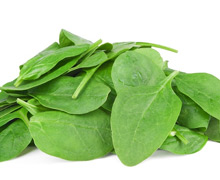
There is concern from some nutrition experts as to the dangers of dietary nitrate, but new research shows they are not all the same and plant-sourced ones actually add to your health's bottom line. Researchers from Edith Cowan University (ECU) in Australia found nitrate from plant sources are associated with a lower risk of mortality, while nitrate from animal-based foods and processed meat is linked to a higher risk of mortality.
Dietary nitrate is the subject of debate with new research showing it may be helpful in preventing cardiovascular disease (CVD), as well as dementia and diabetes. But links to nitrate and cancer have led some to speculate the consumption of things such as leafy green vegetables, which are high in nitrate, should be avoided.
ECU scientist Dr. Nicola Bondonno wanted to make some sense of the debate so she conducted a study and published her findings in the European Journal of Epidemiology. She analyzed data from more than 52,000 participants in the Danish Diet Cancer and Health Study.
Bondonno found those with high intake of plant-based nitrate had between a 14 and 24 percent lower risk of all-cause, CVD-related, and cancer-related mortality. At the same time, higher intake of naturally occurring animal-sourced nitrate was associated with between 9 and 12 percent higher risk, and processed meat nitrate created between a 12 and 22 percent higher risk of the same conditions.
Researchers admit they may not be able to attribute all of the good news solely to plant-based nitrate. That's because there are many other helpful compounds in plants that can be associated with lower risk of CVD, cancer and mortality. However, this should put to rest some of the concern about nitrate-rich vegetables being attributed to an increased cancer risk.
Bondonno said the source of the nitrate determines how the body reacts to it.
"In simplistic terms, nitrate can go down two different pathways when introduced into the body. One is to form a compound called nitric oxide, which has been shown to improve blood flow, lower blood pressure, and support overall cardiovascular health.
"But nitrate may also go down a second pathway, forming a group of compounds called nitrosomines, which are considered to be carcinogenic and are linked to cancer. It is thought that the antioxidant compounds in vegetables push nitrate towards the first pathway."
Click here to read more in the European Journal of Epidemiology.
